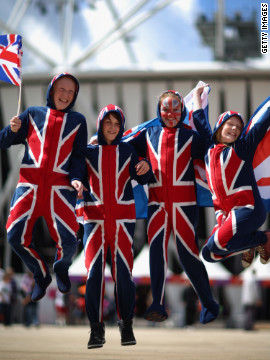PARK LIFE: GAMES LEAVE LONDON WITH A HAPPY GOLDEN GLOW

OLYMPIC FEVER IN LONDON

London — On the streets of London, something strange is afoot. Gone are the blank stares, business suits and gray skies — in their place: Warm smiles, bright outfits and even the odd glimpse of sunshine.
Olympic fever has transformed the city.
Nowhere is this feeling more pronounced than at the Olympic Park, scene of some of home side Team GB’s biggest triumphs and source of the nation’s new-look cheery mood.
A few short years ago, this corner of east London was a post-industrial wasteland, blighted by pollution and contaminated ground and scarred by decades of neglect.
Now it’s a park, packed with wildflowers, public art and world-class sports facilities. And people. Lots of people.
Walking to the site, thousands of face-painted, flag-waving, colorfully-dressed sports fans are met by an army of purple and red-clad volunteers dancing, joking and welcoming them.
Inside, riverside walkways teeming with flowers, all the colors of the rainbow, lead visitors to the venues: the spiky Olympic Stadium, the sweeping Velodrome and the wave-like form of the Aquatics Center.
Gritty East End is London’s gold standard
Along the way, officially-sanctioned buskers and street entertainers are on hand to amuse the crowds, and music pumps from speakers — though it can’t drown out the cheers of fans inside the arenas.
“It’s just great — what they’ve done is fantastic: the venues are stunning and the landscaping looks great,” said Olympics visitor Bethan Slater.
Londoner Slater said she had been lucky enough to see the park during its construction phase: “The transformation from all the mud and machinery back then is amazing,” she told CNN.
“The atmosphere is lovely, really friendly and positive, and it feels so well run, everything is so convenient and easy, right down to the fact there weren’t even any queues for the toilets.”
It’s all a far cry from the gloomy pre-Games predictions: Transport chaos, ticketing debacles, security shambles — and fears of impending sporting disaster.
U.S. Presidential hopeful Mitt Romney earned the ire of UK Prime Minister David Cameron and London’s Mayor Boris Johnson when just days before the torch was lit, he sounded a note of caution, claiming problems in the run-up to the event had been “disconcerting.”
Lesson from history for Olympic missile row?
But former IOC Director Michael Payne said such pre-Olympic jitters were only to be expected, and were common in host countries prior to the opening ceremony.
“In many nations, in the two weeks before the Games, there’s a sense of paranoia, that it’s not going to work, we’re going to embarrass ourselves on the world stage, it’ll be a disaster,” he said.
It’s a view echoed by Slater: “I had so many problems getting tickets — it was farcical — so I was a bit down on the whole thing beforehand, but once I was there, I absolutely loved it.”
Payne said such concerns were quickly forgotten once the Games began: “It’s all paid off, and frankly has gone a lot smoother than they even dared hope.”
One Scottish visitor to London said the Olympics were a welcome distraction from less positive national and international news.
“There’s a lot of negativity going on just now in the UK and worldwide, with the recession, but this has been phenomenal — it’s brought everybody together,” he said.
And while Brits are always happy to cheer on the plucky underdogs — wherever they are from — it is clear that Team GB has benefited from a huge home advantage.
Orbit Tower: Olympic Park’s red ‘roller coaster’
Gold medal-winning rower Pete Reed credited the support of the positive crowds with helping him and his fellow competitors make it to the podium in larger than expected numbers.
“Winning in London, doing it in front of a home crowd, was extraordinary,” he told CNN. “I always thought it could be big, but I didn’t imagine it would be this big — we were lifted right up from the beginning.”
Team GB’s medal gold rush has certainly helped the host nation’s mood, but so has the sense that the games have done Britain proud.
For a few short weeks, the eyes of the world were on London and — to everyone’s surprise — it went well. The hard graft paid off, and the country can, albeit temporarily, cast off its carapace of cynicism, sit back and simply enjoy the moment.
So, will this unexpected good mood last once the torch has been extinguished and the last Olympian has packed their bags and moved out of the village? Will a renewed optimism be one of the legacies of London 2012, alongside the green spaces, the arenas and the thirst for sporting success?
Slater is among those who hope the Games will have a lasting impact on the city and its people.
“The levels of happiness and optimism around at the moment may not last,” she admits.
“But I hope it will neutralize some of the cynicism around, and help people see what is possible when everyone pulls together.




